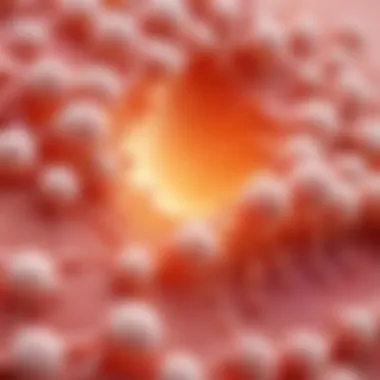Exploring Collagen's Role in Acne Management


Intro
The influence of collagen on skin health is a subject of growing interest in dermatology and wellness. Collagen, a protein that forms the structure of the skin, tends to diminish as we age. This decline can contribute to issues such as reduced skin elasticity, wrinkles, and various skin conditions, including acne. Connecting collagen supplementation to acne management raises questions about the efficacy and role of this protein in skin biology.
In this exploration, we will analyze scientific literature, review anecdotal evidence, and consider skin biology related to collagen. By understanding how collagen interacts with acne lesions, skin health, and elasticity, individuals can make informed decisions regarding their skincare. This article offers insights into types of collagen, effective dosages, potential side effects, and practical applications, aiming to enhance the reader's comprehension of this complex relationship.
Understanding Collagen
Understanding the role of collagen is crucial when exploring its impact on acne. Collagen is a protein that acts as one of the major building blocks for skin, along with bones, muscles, and tendons. It provides structure and support, playing an important role in skin health. The condition of the skin affects various aspects of acne, including the severity of outbreaks and the healing process. There is therefore a direct link between collagen levels and overall skin health, making it essential for those looking to manage acne effectively.
What is Collagen?
Collagen is a structural protein found in various connective tissues. It is comprised of amino acids and forms a fibrous network that imparts strength and elasticity to the skin. This protein constitutes about 70% of the skin and is vital for maintaining its firmness and suppleness. Collagen production diminishes with age, largely contributing to signs of aging like wrinkles and sagging skin. Recognizing what collagen is helps individuals appreciate its importance in relation to acne and overall skin vitality.
Types of Collagen
Collagen comes in several types, each with distinct characteristics and benefits. Understanding these types can guide choices related to supplementation or treatment for acne.
Type
Type I collagen is the most abundant form, making up about 90% of the body's collagen. It possesses high tensile strength, which is essential for skin structure. Its key characteristic is its capacity to enhance skin elasticity, therefore facilitating quicker healing of acne lesions. Type I is popular for skin health because it can significantly improve overall skin texture and hydration. Incorporating this type may lead to a reduction in acne scarring, thus making it a valuable component in acne management.
Type
Type II collagen primarily exists in cartilage and is vital for joint health. While it is not as directly related to skin health, it still plays a supportive role in the body. However, its relevance to acne is limited. The main characteristic of Type II is its ability to maintain structural integrity in joints, which may indirectly affect mobility and overall wellness. Therefore, it is less crucial for skin-related benefits compared to Type I. Specific advantages of Type II lie within joint support rather than skin enhancement.
Type
Type III collagen is often found alongside Type I and is crucial during the initial stages of wound healing. It helps provide elasticity and firmness, key traits needed for repairing skin damaged by acne. The unique feature of Type III is its abundant presence in the skin's initial healing processes. However, it's not as common in supplements as Types I and II. Its contributions to early skin repair make Type III beneficial, particularly in the context of acne scars.
The Role of Collagen in Skin Health
Collagen plays an instrumental role in maintaining skin health. Its presence ensures structural support, which is essential for managing acne effectively. As collagen levels decline, the skin can become weaker, often resulting in issues such as increased irritation, more apparent scarring, and slower healing processes for acne. By understanding the significance of collagen in skin health, individuals can make informed decisions when considering supplementation or topical application as part of their acne management strategies.
Acne: An Overview
Acne is a prevalent skin condition affecting people of all ages. Understanding its causes and manifestations is crucial to developing effective treatment strategies. This section provides insights into the reasons behind acne, the various types it can manifest as, and its psychological effects. Acne is not merely a cosmetic issue; it often has deeper implications on mental health and social interactions. Recognizing its complexity can pave the way for holistic approaches that may include collagen supplementation, thus enhancing skin health.
What Causes Acne?
Issues surrounding acne are often multifactorial and can be grouped into several categories:
Hormonal Factors
Hormones play a significant role in acne development. Fluctuations in hormones, especially during puberty or the menstrual cycle, lead to increased oil production in the skin. This excess oil can clog pores, leading to breakouts. Understanding hormonal influences is critical because it may guide therapeutic measures. For instance, treatments focusing on hormone regulation might be beneficial. However, treating the hormonal root cause often requires patience and a tailored approach, as hormonal imbalances can take time to correct.
Bacterial Influence
The skin hosts various bacteria, both beneficial and harmful. One bacterium, Propionibacterium acnes, thrives in clogged pores and exacerbates inflammation. The interaction between this bacteria and the body’s immune response contributes significantly to acne formation. Addressing bacterial infections can be essential in acne management. While topical and systemic antibiotics are commonly prescribed, caution is necessary. Overuse can lead to resistance, making this a less favorable option over time.
Environmental Factors


Environmental factors such as pollution, humidity, and exposure to irritants can also aggravate acne. These external elements can contribute to skin irritation, creating an environment conducive to both bacterial growth and pore blockage. Awareness of one's environment can inform better skincare choices, minimizing triggers. For example, individuals living in urban settings might benefit from targeted skincare routines that focus on pollution control.
Types of Acne
Acne is not a monolithic condition; it can present in various forms:
Comedonal Acne
Comedonal acne is characterized by the presence of comedones, which are blocked hair follicles. They can be open (blackheads) or closed (whiteheads). This type of acne tends to be less inflammatory than others, making it relatively easier to treat. Simple exfoliation and the use of retinoids can be effective in managing this condition. Despite its simpler presentation, comedonal acne can be persistent and may lead to darker spots if not addressed promptly.
Inflammatory Acne
Inflammatory acne includes papules and pustules. These forms of acne are marked by redness and swelling, indicating that deeper layers of skin are affected. Inflammatory acne results from an immune response to bacteria and sebum accumulation. Treatment often requires a multi-faceted approach, including topical treatments or oral medications. The physical appearance of inflammatory acne can lead to significant distress for many individuals.
Cystic Acne
Cystic acne is one of the most severe forms, presenting as large, painful cysts beneath the skin. This type often requires aggressive treatment due to its potential to scarring. Cystic acne can result from hormonal fluctuations, and understanding this aspect can guide effective interventions. Given its significant impact on skin health and the psyche, collaboration with healthcare providers is essential to formulate a comprehensive treatment strategy.
The Psychological Impact of Acne
Acne can have profound psychological effects that are often ignored in the discussion about this condition. The visibility of acne can lead to embarrassment, low self-esteem, and social withdrawal. Many individuals report feeling anxious or depressed due to their skin condition. Addressing the emotional and mental aspects of acne is just as important as physical treatment. Mental well-being plays a substantial role in how individuals manage their skincare routines. Understanding that patients need support on this front can lead to better overall outcomes.
Link Between Collagen and Acne
Understanding the link between collagen and acne is crucial for individuals exploring skin health solutions. Collagen is a protein responsible for maintaining skin elasticity and structure. It plays a significant role in wound healing and skin regeneration. Given its importance, many are curious about its implications on acne management.
Does Collagen Help with Acne?
The efficacy of collagen in treating acne is still a subject of ongoing research. Some studies suggest that collagen may reduce the severity of acne. This occurs by improving skin barrier function and promoting healing of acne lesions. Increased collagen levels can lead to enhanced skin elasticity. This might help minimize the appearance of scars.
However, it is essential to note that collagen alone is unlikely to resolve acne issues. Factors such as hormonal fluctuations and bacteria typically drive acne. Therefore, while collagen can provide supportive benefits, it may not be a standalone solution.
Research Findings
Numerous studies have examined the relationship between collagen and acne.
- Clinical trials: Some trials have shown improvement in acne lesions among participants using collagen supplements. These improvements were correlated with enhanced skin hydration and elasticity.
- Skin biopsies: Research involving skin biopsies has indicated that collagen levels are often lower in acne-prone skin compared to healthy skin. This might imply a potential role of collagen in skin health and acne dynamics.
Despite these promising findings, more extensive and controlled studies are necessary to draw definitive conclusions about the impact of collagen on acne.
Anecdotal Evidence
User testimonials and personal experiences also provide insight into collagen's potential benefits. Many individuals report positive changes in their skin after incorporating collagen supplements. They note fewer breakouts, smoother texture, and improved healing of existing acne.
However, anecdotal evidence should be approached with caution. Individual results can vary widely, influenced by diet, lifestyle, and genetics. While these stories can be motivating, they do not replace the need for scientific backing.
Types of Collagen Supplementation
When discussing collagen, it is crucial to examine the various types of collagen supplementation available in the market. Collagen impacts skin elasticity and overall health, making it essential for those seeking to manage acne effectively. Different sources and forms of collagen provide varied benefits and considerations for users. Understanding these factors can guide individuals in selecting the optimal type that aligns with their specific needs.
Marine Collagen
Marine collagen is derived from fish, known for its ability to improve skin hydration and elasticity. Rich in Type I collagen, which is the most abundant collagen type in human skin, marine collagen is often praised for its bioavailability. This suggests that the body can easily absorb and utilize it effectively.


The benefits of marine collagen extend beyond mere elasticity. Users frequently report a noticeable reduction in acne appearance and overall skin clarity. This could be attributed to its potential to reduce inflammation and promote faster healing of acne lesions. In addition, as marine collagen aids in skin structure restoration, it may contribute to improved overall skin tone.
Bovine Collagen
Bovine collagen is sourced from cows and is typically rich in Types I and III collagen. This type has gained popularity due to its effectiveness in promoting skin health and muscle recovery. Bovine collagen is also known for its capacity to reduce the appearance of wrinkles and enhance skin hydration.
By supporting skin integrity, bovine collagen may help manage acne symptoms. The amino acids in this type provide essential nutrients to the skin, facilitating repair and regeneration. Skin that is nourished and structurally sound is better equipped to resist breakouts, making bovine collagen a viable option for acne management.
Collagen Peptides vs. Gelatin
Both collagen peptides and gelatin are derived from collagen but differ in their composition and form. Collagen peptides are hydrolyzed, meaning they have been broken down into smaller, more easily absorbed chains of amino acids. This makes them popular for supplementation, as they require less digestion and can quickly benefit skin and other tissues.
Gelatin, on the other hand, is cooked collagen that remains whole. While it still provides benefits, particularly in terms of joint health and digestion, it may not be as efficiently absorbed as collagen peptides. If the primary goal is to enhance skin health and manage acne effectively, collagen peptides may hold a slight advantage due to their enhanced bioavailability.
To summarize, the choice of collagen supplementation can significantly affect skin health, particularly in managing acne. Marine and bovine collagen provide unique benefits that may aid individuals in their journey toward healthier skin. Collagen peptides are favored for their absorbability, making them a practical choice for those focused on prompt results.
"Understanding the differences between collagen types can lead to more informed choices in skin care regimes, especially for those dealing with acne problems."
Choosing the right type of collagen can empower individuals to take control of their skin health and explore effective paths for managing acne.
Incorporating Collagen into Skincare Regimens
Including collagen in skincare regimens can be essential for those looking to improve skin quality, particularly in relation to acne. Collagen plays a significant role in maintaining skin structure and elasticity, factors critical for healthy skin. By understanding how to effectively incorporate collagen, individuals can enhance their skincare routines while targeting acne-related concerns.
Collagen Supplements
Types of Supplements
Collagen supplements are available in various forms, such as powders, capsules, and liquid. Each type offers unique benefits that cater to different user preferences. For instance, collagen powders are often favored for their versatility, as they can be added to drinks, smoothies, or meals easily without altering taste. Capsules, on the other hand, provide a convenient option for those who prefer quick ingestion.
With companies like Vital Proteins and Neocell leading the market, collagen peptides are often highlighted for their quick absorption in the body. This characteristic makes them a popular choice for individuals aiming for rapid results. However, it is important to consider personal preferences and lifestyle when choosing a supplement type, as each may have its advantages and disadvantages.
Recommended Dosages
The recommended dosages for collagen supplements vary among products; however, many experts suggest a daily intake of 5 to 15 grams. This amount is generally regarded as effective for skin benefits. Consistent use over time is crucial to see results in skin health.
Dosage can depend on the specific product used, so reading labels is essential. Some manufacturers suggest higher doses, yet it is critical to assess tolerance and any potential adverse reactions, especially for those with sensitivities. Moreover, determining the ideal dosage might require some experimentation to identify what works best for individual skin needs.
Topical Collagen Products
Topical collagen products, such as creams and serums, aim to deliver collagen directly to the skin. These formulations often contain hydrolyzed collagen, making it easier for the skin to absorb. While the effectiveness of these products is often debated, they may improve hydration and create a temporary plumpness. Regular application can potentially lead to better skin texture, which can be beneficial for acne-prone skin.
Dietary Sources of Collagen
Integrating collagen-rich foods into daily diets is another effective way to boost collagen levels naturally. Foods like bone broth, chicken skin, and fish are excellent sources. Additionally, consuming vitamin C-rich fruits and vegetables can support collagen synthesis in the body. Options like kiwi, oranges, and bell peppers are ideal complements to a collagen-inclusive diet.
In summary, incorporating collagen into skincare regimens, whether through supplements, topical products, or dietary changes, presents an opportunity for enhancing skin health and addressing acne. Understanding different forms, dosages, and sources can empower individuals to make informed choices, ultimately improving their skin quality.
Potential Side Effects and Considerations
Understanding the potential side effects and considerations surrounding collagen supplementation is essential for anyone contemplating its use in acne management. While collagen can offer various benefits for skin health, it also comes with risks that should not be overlooked. Individuals should approach collagen supplementation with a well-informed mindset, weighing its advantages against possible adverse reactions.
Incorporating collagen into one’s skincare regimen can yield improvements in skin hydration and elasticity. However, it is important to recognize that individuals may react differently to collagen sources, whether from marine or bovine origins. Moreover, the body’s response can vary based on a person's health status, dietary habits, and even genetic predisposition. This necessitates a careful assessment of personal health needs and goals.


Possible Adverse Reactions
While collagen is generally considered safe, some individuals may experience adverse reactions. Possible effects can include:
- Digestive Issues: Some users report gastrointestinal discomfort, such as bloating or diarrhea. These symptoms, while often temporary, can discourage continued use of collagen supplements.
- Allergic Reactions: Those with allergies to fish or bovine products may have a heightened risk of allergic reactions when using marine or bovine collagen, respectively. Symptoms could range from mild hives to more severe anaphylactic responses.
- Impact on Blood Sugar Levels: Some studies indicate that collagen supplements might influence glucose metabolism, leading to potential fluctuations in blood sugar levels. Those with diabetes or similar conditions should monitor their blood sugar closely.
"Understanding how your body responds to collagen is critical for ensuring its safe use, especially in individuals with existing health conditions."
To minimize risks, it is advisable to start with small doses and observe how your body reacts before increasing the intake. Keeping a health diary may help track any changes or adverse effects experienced.
Consulting Healthcare Professionals
Before starting any new supplement, including collagen, it is wise to consult a healthcare professional. This step is crucial for several reasons:
- Personalized Advice: A healthcare provider can evaluate personal health conditions and medications that may interact adversely with collagen supplements. Individual needs vary, and an expert can tailor advice specific to personal circumstances.
- Risk Assessment: Professionals can help assess the potential risks based on one's medical history. This is particularly important for individuals with existing health concerns such as allergies, autoimmune disorders, or kidney issues.
- Monitoring: Regular check-ins with a healthcare provider can help ensure that the body is responding favorably to collagen. Adjustments to dosage or type of collagen may be recommended based on monitoring.
In summary, while collagen can provide advantages for skin health, its use in acne management requires thoughtful consideration of potential side effects and professional guidance. Ensuring informed decisions and monitored use can enhance the benefits while minimizing risks associated with collagen supplementation.
Comparative Analysis: Collagen vs. Other Treatments
In this section, we explore how collagen supplementation measures against both established and alternative acne treatments. The importance of this comparative analysis lies in understanding not just the effectiveness of collagen but also its safety and suitability compared to other commonly used therapies. Understanding these comparisons helps individuals make informed decisions regarding skincare options.
Prescription Medications
Prescription medications, such as isotretinoin and antibiotics, are often considered the gold standard for severe acne treatment. Isotretinoin, a retinoid derived from vitamin A, significantly reduces oil production and helps prevent clogged pores. However, it comes with potential side effects, including dryness, photosensitivity, and in severe cases, mental health concerns. Antibiotics, on the other hand, target bacteria and reduce inflammation, but long-term use can lead to antibiotic resistance.
Collagen's role diverges here. It does not specifically treat the underlying causes of acne but may aid in healing acne scars and improving skin elasticity. Individuals seeking less aggressive interventions might find collagen supplements a gentler alternative or complementary approach to prescription treatments.
Over-the-Counter Treatments
Over-the-counter (OTC) treatments are accessible and popular options for managing mild to moderate acne. Common ingredients include benzoyl peroxide, salicylic acid, and alpha hydroxy acids. These ingredients work to reduce inflammation, exfoliate, and kill bacteria.
While effective, OTC treatments can sometimes cause irritation, especially for sensitive skin. Here, collagen supplementation can offer additional benefits. By promoting skin health and supporting structural integrity, collagen might enhance the efficacy of these OTC solutions when used together. Users should carefully monitor their skin's response to avoid adverse reactions.
Natural Remedies
Natural remedies—a growing trend in skincare—offer alternatives to traditional treatments. These include tea tree oil, witch hazel, and honey. Each has its own potential benefits, such as anti-inflammatory properties and antibacterial effects. However, scientific backing varies, and results may be inconsistent among individuals.
Collagen can complement these remedies. By providing structural support to the skin, it may enhance overall skin resilience, making it more receptive to natural treatments. This combination can optimize the overall health of the skin while minimizing reliance on harsher treatments.
The use of collagen, in conjunction with natural remedies, can potentially create a synergistic effect, promoting clearer skin while being gentler on the epidermis.
Culmination
The conclusion of this article serves as a crucial element, tying together the various insights discussed about collagen and its relationship with acne. It brings clarity to the topic by summarizing the benefits, considerations, and practical implications for those interested in exploring collagen supplementation.
Summarizing Key Insights
Throughout this exploration, we have uncovered several key points regarding collagen's impact on acne. Firstly, collagen is essential for maintaining skin elasticity and overall health. Its role in cellular repair can play a part in managing acne lesions. Moreover, studies show varying degrees of effectiveness when collagen is introduced either as a supplement or in topical applications. For many individuals, consistent use may lead to noticeable improvements in skin texture and hydration.
In addition to its direct benefits, collagen supplementation can also assist in creating an optimal environment for acne management. A diet rich in collagen-producing foods, alongside targeted supplements, can ultimately enhance the body's natural recuperative abilities.
Future Research Directions
Looking ahead, further research is imperative to unlock the full potential of collagen in acne treatment. Clinical studies focusing on the specific types of collagen and their effectiveness in varied demographic groups will deepen our understanding. Additionally, investigating the synergy between collagen and other therapeutic modalities could yield comprehensive approaches for treating acne.
There remains a gap in understanding how different methods of collagen intake affect skin health differently. Future studies can also explore the long-term impacts of regular collagen use, and whether variations in diet alter these outcomes. These avenues are crucial not only from a scientific perspective but are also essential for individuals seeking effective acne management solutions.
Research remains a cornerstone of holistic acne treatment, and collagen may be one area ripe for discovery.















